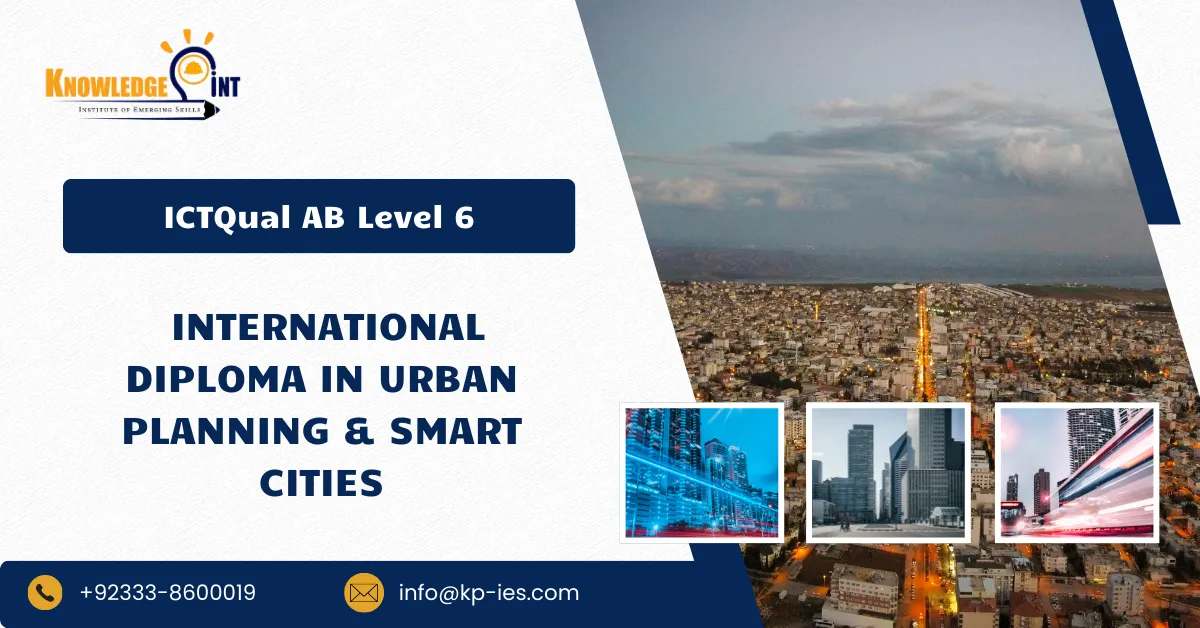The ICTQual AB Level 6 International Diploma in Urban Planning & Smart Cities is a globally recognized qualification designed for learners aspiring to shape the future of urban environments. This advanced program combines the principles of traditional urban planning with the innovations of smart city technologies, sustainability, and digital transformation.
The diploma is structured into three years of study with 36 mandatory units, ensuring learners gain a comprehensive foundation, intermediate practice knowledge, and advanced leadership skills in urban planning and smart city management.
In Year 1, learners are introduced to the fundamentals of urban planning, smart city concepts, project scheduling, construction materials, stakeholder management, and legal frameworks. Year 2 emphasizes applied practices such as advanced planning techniques, sustainability, procurement, cost management, and leadership in urban projects. Finally, Year 3 develops advanced expertise in strategic urban planning, mobility systems, smart technologies, and governance, culminating in a capstone project and professional development.
Course Overview
This qualification, the ICTQual AB Level 6 International Diploma in Urban Planning & Smart Cities, consists of 36 mandatory units.
Year 1 – Foundation in Urban Planning & Smart Cities
- Principles of Urban Planning and Smart Cities
- Introduction to Urban Development Projects
- Construction Materials and Methods in Urban Infrastructure
- Spatial Planning and Design Principles
- Project Planning and Scheduling in Urban Projects
- Health, Safety, and Environmental Awareness
- Communication and Stakeholder Management in Urban Planning
- Digital Tools and Construction Technology Fundamentals
- Financial Management in Urban Projects
- Quality Assurance and Control in Urban Development
- Legal and Regulatory Frameworks in Urban Planning
- Professional Ethics and Conduct in Planning
Year 2 – Intermediate Urban Planning & Smart Cities Practices
- Advanced Urban Design and Planning Techniques
- Resource Management and Allocation in Projects
- Project Cost Estimation and Budgeting in Urban Development
- Construction Contract Administration
- Procurement and Supply Chain Management in Urban Projects
- Project Risk Analysis and Mitigation
- Leadership and Team Management in Urban Planning
- Site and Infrastructure Management
- Sustainable Development and Environmental Management
- Project Monitoring and Reporting
- Problem-Solving and Decision-Making in Urban Projects
- Communication and Negotiation Skills in Planning
Year 3 – Advanced Urban Planning & Strategic Leadership
- Strategic Urban Planning and Smart City Management
- Advanced Infrastructure and Project Planning
- Urban Transport and Mobility Systems Management
- Innovation and Emerging Technologies in Smart Cities
- Advanced Risk and Crisis Management in Urban Projects
- Contract Management and Legal Compliance
- Leadership in Urban Planning Projects
- Advanced Project Control and Performance Measurement
- Project Governance and Compliance in Smart City Projects
- Research Methods and Project Analysis in Urban Planning
- Capstone Project in Urban Planning & Smart Cities
- Professional Development and Career Planning
Learning Outcomes – ICTQual AB Level 6 International Diploma in Urban Planning & Smart Cities
Year 1 – Foundation in Urban Planning & Smart Cities
- Principles of Urban Planning and Smart Cities
- Understand key principles of urban planning and smart city concepts.
- Apply sustainable and technological solutions in city development.
- Recognize global challenges of urbanization.
- Introduction to Urban Development Projects
- Identify stages of urban development projects.
- Recognize roles and responsibilities in project teams.
- Apply introductory planning and documentation methods.
- Construction Materials and Methods in Urban Infrastructure
- Understand materials used in urban infrastructure projects.
- Evaluate construction methods for city projects.
- Select appropriate materials for sustainability and efficiency.
- Spatial Planning and Design Principles
- Apply spatial planning and zoning concepts.
- Integrate design principles in urban layouts.
- Recognize cultural and environmental impacts of spatial planning.
- Project Planning and Scheduling in Urban Projects
- Apply planning techniques in urban project management.
- Use scheduling tools to manage timelines.
- Monitor project progress effectively.
- Health, Safety, and Environmental Awareness
- Apply safety standards in urban development.
- Recognize environmental impacts of projects.
- Promote sustainable practices in planning.
- Communication and Stakeholder Management in Urban Planning
- Communicate effectively with stakeholders.
- Manage urban planning conflicts.
- Apply negotiation skills in community engagement.
- Digital Tools and Construction Technology Fundamentals
- Use digital tools in urban project design.
- Apply construction technologies in planning.
- Analyze benefits of digital transformation in cities.
- Financial Management in Urban Projects
- Apply financial principles in urban planning.
- Prepare budgets and cost control measures.
- Analyze financial risks in projects.
- Quality Assurance and Control in Urban Development
- Apply quality management systems in planning.
- Monitor quality standards in urban projects.
- Ensure compliance with regulations.
- Legal and Regulatory Frameworks in Urban Planning
- Understand planning laws and regulations.
- Apply compliance measures in projects.
- Evaluate legal risks in urban projects.
- Professional Ethics and Conduct in Planning
- Apply professional ethics in planning practices.
- Recognize responsibilities of urban planners.
- Promote transparency and accountability.
Year 2 – Intermediate Urban Planning & Smart Cities Practices
- Advanced Urban Design and Planning Techniques
- Apply advanced urban design methods.
- Integrate sustainable and smart city solutions.
- Evaluate case studies in city planning.
- Resource Management and Allocation in Projects
- Manage human, financial, and material resources.
- Allocate resources effectively in projects.
- Optimize resource use for sustainability.
- Project Cost Estimation and Budgeting in Urban Development
- Prepare accurate cost estimates.
- Apply budgeting tools for urban projects.
- Control costs in large-scale developments.
- Construction Contract Administration
- Understand contract processes in urban projects.
- Manage contract obligations and risks.
- Apply dispute resolution methods.
- Procurement and Supply Chain Management in Urban Projects
- Apply procurement strategies in planning.
- Manage urban supply chain networks.
- Evaluate efficiency in procurement systems.
- Project Risk Analysis and Mitigation
- Identify risks in urban development.
- Apply mitigation strategies.
- Monitor project risks continuously.
- Leadership and Team Management in Urban Planning
- Apply leadership styles in planning teams.
- Manage collaboration across stakeholders.
- Promote effective decision-making.
- Site and Infrastructure Management
- Manage site operations in urban projects.
- Ensure safety and compliance in infrastructure development.
- Apply innovative site management practices.
- Sustainable Development and Environmental Management
- Integrate sustainability into urban planning.
- Promote environmental conservation.
- Apply sustainable resource practices.
- Project Monitoring and Reporting
- Track project progress.
- Apply digital tools for monitoring.
- Report findings for decision-making.
- Problem-Solving and Decision-Making in Urban Projects
- Apply critical thinking in planning.
- Use structured approaches to problem-solving.
- Make informed project decisions.
- Communication and Negotiation Skills in Planning
- Strengthen communication in urban projects.
- Apply negotiation strategies in planning.
- Build strong stakeholder relationships.
Year 3 – Advanced Urban Planning & Strategic Leadership
- Strategic Urban Planning and Smart City Management
- Apply strategies for long-term urban growth.
- Integrate smart technologies in city planning.
- Promote resilience and sustainability in smart cities.
- Advanced Infrastructure and Project Planning
- Design advanced infrastructure systems.
- Apply project planning tools at scale.
- Optimize infrastructure delivery.
- Urban Transport and Mobility Systems Management
- Understand urban transport systems.
- Apply smart mobility solutions.
- Plan for sustainable transport integration.
- Innovation and Emerging Technologies in Smart Cities
- Explore new technologies in city planning.
- Apply IoT, AI, and digital tools in smart cities.
- Evaluate benefits and challenges of innovation.
- Advanced Risk and Crisis Management in Urban Projects
- Identify crises in urban development.
- Apply crisis management strategies.
- Promote resilience in urban planning.
- Contract Management and Legal Compliance
- Apply contract management principles.
- Ensure compliance with planning laws.
- Manage disputes effectively.
- Leadership in Urban Planning Projects
- Demonstrate leadership in urban planning.
- Manage interdisciplinary teams.
- Promote ethical leadership practices.
- Advanced Project Control and Performance Measurement
- Apply performance metrics in urban projects.
- Control project outcomes effectively.
- Use advanced project control tools.
- Project Governance and Compliance in Smart City Projects
- Apply governance frameworks in smart cities.
- Ensure compliance with global standards.
- Monitor smart city performance.
- Research Methods and Project Analysis in Urban Planning
- Apply research methodologies in planning.
- Analyze urban data for decision-making.
- Prepare academic and professional reports.
- Capstone Project in Urban Planning & Smart Cities
- Integrate knowledge into a comprehensive project.
- Apply research and innovation skills.
- Demonstrate professional competency.
- Professional Development and Career Planning
- Develop career strategies in urban planning.
- Identify continuous learning opportunities.
- Prepare for professional certifications.
Course Benefits of ICTQual AB Level 6 International Diploma in Urban Planning & Smart Cities
- Builds advanced knowledge in urban planning, smart city design, and sustainable development.
- Provides practical skills in digital tools, project management, and governance.
- Strengthens leadership, communication, and negotiation skills.
- Encourages innovation with exposure to smart mobility and IoT-driven solutions.
- Enhances employability in urban planning, policy, and smart infrastructure projects.
- Equips learners with advanced risk, financial, and resource management skills.
- Offers opportunities for research and a capstone project to demonstrate expertise.
- Develops global perspectives on urbanization challenges and solutions.
- Promotes ethical and sustainable practices in city planning.
- Provides a pathway to professional recognition and advanced studies.
After completing this course, learners can progress in the following ways:
- Progress to postgraduate programs such as a Master’s in Urban Planning, Smart Cities, or Sustainable Development.
- Advance into specialist certifications in GIS, BIM for Smart Cities, or Sustainable Urban Design.
- Gain professional membership with bodies such as RTPI (Royal Town Planning Institute) or ISOCARP.
- Pursue careers as Urban Planner, Smart City Consultant, Policy Advisor, Infrastructure Manager, or Sustainability Expert.
- Work with international organizations, governments, consultancies, and NGOs in urban and smart city development.
- Build a pathway toward leadership roles in urban governance, smart mobility, and sustainable infrastructure projects.







